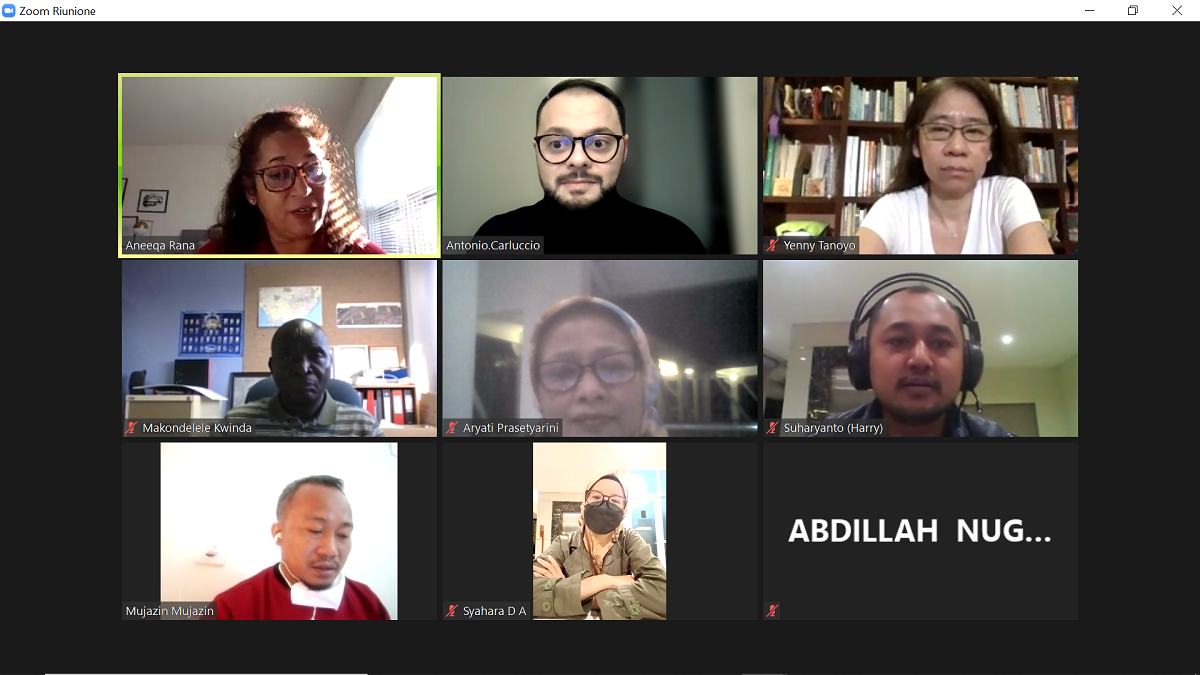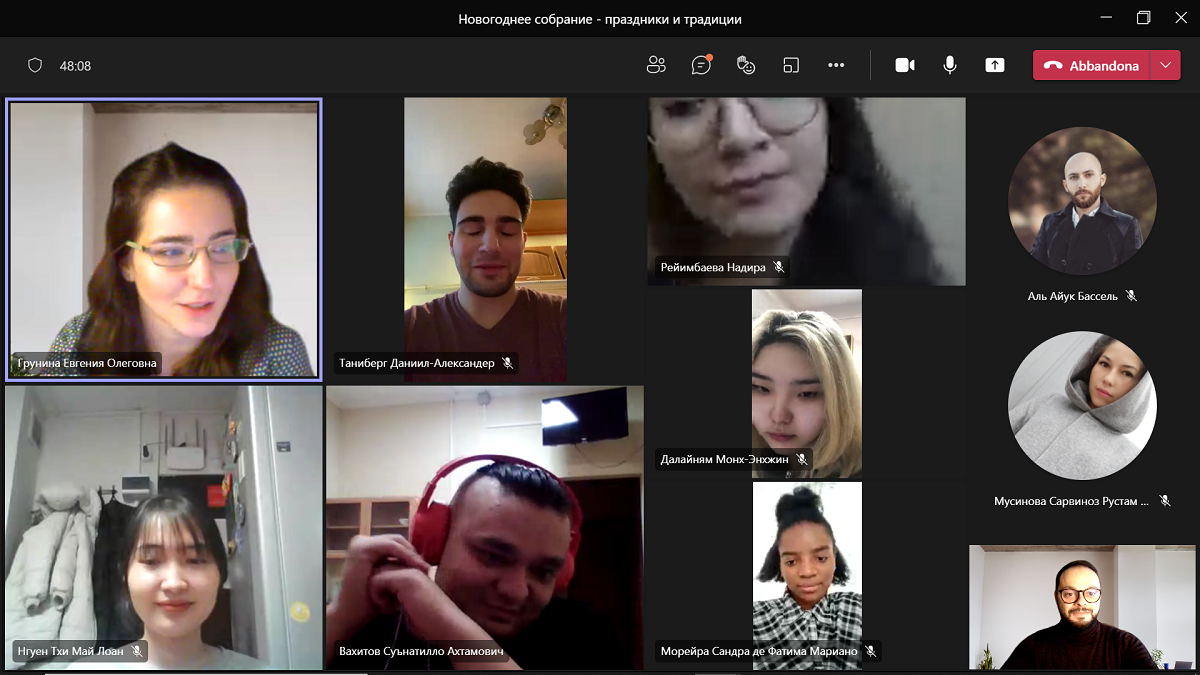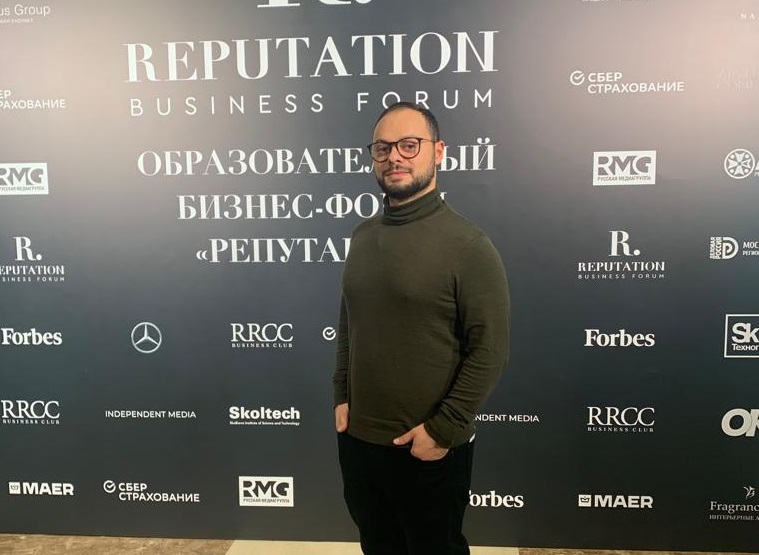“My heart and soul brought me to Russia,” Antonio Carluccio, lecturer at the Faculty of Philology of the Peoples’ Friendship University of Russia
Antonio, you graduated the Harvard program (Harvard University, QS WUR #5). What courses do you remember?
For 6 weeks, I took Harvard’s Online Teaching and Learning in Action online courses. We studied innovation in a virtual classroom and developed prototypes of innovative proposals. I liked project-based learning and the subjects “Design Thinking” and “Research Community”. We learned how to organize group work of students in online lessons, how to monitor progress and how to deal with conflicts through discussions.
How did you get into Harvard for this program?
The International Department of the Faculty of Philology supports teachers who participate in conferences and courses. Under the international (virtual) mobility support program, I found funding for courses at Harvard. I was looking for something like this for a long time, studied the offers of leading universities ... It was not easy, because not all universities have a section with all the programs of continuing professional education. Then I realized that I need to focus on large and prestigious universities, whose education is designed for an international audience. Their websites make it easier to find what you need. Of course, the question remains: what and how to look for? Professional development programs for graduate professionals do not have a common name, so I had to choose keywords for search.
Where did you study as an undergraduate student and what topics did you like?
Like many young people from southern Italy, I moved to the north for prospects. In 2010, I entered the University of Bologna — it is considered the oldest in the Western world. Bologna is a truly student city. People from all over the world study there. This is a small city where the atmosphere of international friendship reigns.
At the Faculty of Foreign Languages, I studied “Modern Foreign Languages and Literature.” You can choose 2 or 3 languages in this course. First, the choice fell on Russian and English. Then English became the third choice, while Polish became the second language. And the Russian language and literature remained my major.
The Russian language was my favorite subject — I tried not to miss a single lesson. I studied at least a couple of hours every day. At home, we studied according to the textbook by RUDN Professor Serafima Khavronina “Russian Language in Exercises”. Then I could not even think that someday I would listen to her lectures live and work with her at the department.
What inspired you to study in Russia?
Already in the first year, I realized that it is better to study languages in a language environment. It was possible to fully understand the Russian and Polish languages only in Russia and Poland. Of course, I talked with Italian undergraduates who were learning Russian. They talked about their experiences in Russia, where they studied as an exchange student or took courses at private educational institutions. As a person from southern Italy, I have always been attracted to northern cities: Moscow, St. Petersburg, Murmansk. I started using the VKontakte social network to communicate with native Russian speakers. And it was useful — I replenished my vocabulary and grammar and overcame the language barrier.
In my second year, I won a grant for a summer school in Warsaw, and I was also chosen to study at RUDN for one semester — I flew to Russia for the first time in 2012. The following year I received a European Erasmus grant and studied at the University of Warsaw for a whole year. In the same year, I won another grant from the Ministry of Education of Poland for a summer training program.
I defended my thesis in Russian and Polish literature. And then plans for study, work and self-development were closely connected with Russia. I am often asked: “Why Russia?”. My choice seems so natural to me that I simply answer — my heart and soul were drawn to Russia.
You teach at the Department of the Russian Language and Methods of its Teaching. What disciplines and audiences are your favorite?
All the disciplines that I teach are related to the Russian language, so I like them very much. I prefer to work with first-year students because I see myself in them — once I also entered university. I understand their doubts and desires. Students don’t always talk about it openly, but it still feels like even the best students have misgivings. Some willingly write to me about this in a personal chat, and together we sort it out. The key point in my practical classes in Russian as a foreign language is that I try to create conditions for my students to become more confident.
I enjoy working with psychology students — with them we explore deep topics about the psyche, personality development, and human relationships. They love to speak their mind. I often learn new things from them. Our students are a treasure of knowledge and experience, they only need to be revealed.
Of course, it is easier to work with students who already know how to speak Russian. But my job is to make sure that everyone reaches a certain level. Not knowing the Russian language is not a problem if there is a desire to understand each other. It is easier to communicate with students who are native speakers of the Slavic language, as I understand Western and South Slavic languages. Students from Latin America or French-speaking Africa can be supported with statements in their own language. English also helps, but not all students speak it. Now I am learning Turkish. A good teacher should find an approach to any student and create a community of different students.
You are an expert in online learning. What are the advantages and “weaknesses” of the distance learning format?
Two years ago distance was an “emergency” format. Then we had no other choice and enough time to master all possible resources. We adjusted the face-to-face methodology to new technologies. However, in the process, we realized that this temporary format has turned into a promising one. Some undergraduate students did not study in a classroom with a teacher — they have no other idea of higher education. I believe that online learning will develop. Colleagues from Harvard University confirm this. If we want to be competitive, we should take this into account. In the distance learning format, I especially appreciate the activity of students, because I do not see them. It is important for us, teachers, to know that everyone is “keeping pace”.
Advantages:
- Student spending is going down. We did a study among Italian RFL students at the University of Parma — they called it the main advantage. The student can stay in their hometown and attend classes via phone, laptop or tablet. Savings on monthly rent in large university cities, on travel to the place of study ... Higher education has become more accessible. I also studied online at Harvard University with colleagues from all over the world. Now you can choose courses and programs to your liking and interests, and not just your pocket. But there is less university experience. The student stays in his home with parents, not meeting new people, classmates, not using the library, the university stadium ...
- More creative tools in online classes. I’m not only talking about visual materials, but also about working in groups in separate virtual rooms. Oddly enough, in a virtual classroom, you can more effectively follow the work of students. And also create content for synchronous and asynchronous work. Difficult topics can be taken together, and easier or more creative tasks can be given in groups or individually. E-writing skills on the keyboard are developing, which is important in the era of digitalization. Moreover, homework can be not only written, but also in audio or video format. You can create student surveys to understand what students have learned and what needs to be revised.
To properly use all resources, you need to invest time and energy in learning and experimenting. The real innovation in learning is not bringing old practices online, but creating something new. - Expansion of the target audience of students, graduate students, listeners. Applicants are attracted by prestigious universities, where you can now study remotely. This expands the geography of presence. It is necessary to rely on individual online courses that complement the overall offer of each faculty, and introduce more courses in English in order to be competitive among the world’s leading universities.
Weaknesses:
- Technical problems. Even in 2022, not everyone has quality internet access. In many cities in Europe or Russia, the network is very weak. This is a real obstacle for students and teachers. Another important role is played by the equipment itself. I had to change my laptop in order to conduct classes in a quality manner. The cost of equipment in 2020 has risen sharply due to increased demand for personal working devices. In addition, you have to delve into technology, and this is not easy.
Many do not have any personal workspace. There may be children, relatives and pets in the house who need attention ... There is often a “neighbor with a drill” nearby. From personal experience I know how uncomfortable it is in the classroom when repairs are underway behind the wall. - Problems with physical and mental health. We used to use smartphones and laptops primarily for entertainment and communication — now we use them for everything. We spend most of our time behind a screen. You have to create a more comfortable workplace so that your back does not hurt at the end of the day, buy glasses with filters and take breaks to avoid headaches. The lines between work and personal life have become more blurred. It happens that you receive messages or emails at night — that’s the difference in time zones. Mental health also suffers from a lack of personal contact with colleagues, students, and classmates. We lack emotions, we lose sociality. Teachers and students use all possible tools to keep in touch. But you must admit — this is still an unrealistic interaction.
- There is more motivation on the part of the student and more workload for both parties. We began to work more due to the increased workload and active support of communication with students. Students also note this trend, and it is not always possible for them to combine their personal lives with their studies. Now it is more noticeable which of the students is more motivated and who spends more time studying.
RUDN University staff and alumni received state and departmental awards at the State Kremlin Palace during a festive concert in honor of RUDN 65th anniversary.
An architectural-landscape project by a 5th-year student of RUDN has been shortlisted for the annual International Professional ADD AWARDS 2024 for architects, designers, and developers in the “Urban Environment” category.
RUDN University employees’ work and contribution to the development of the university cannot go unappreciated. The Ministry of Science and Higher Education of Russia recognizes talented university employees and present them with various departmental and state awards.
.jpg)
.jpeg)
.jpeg)



